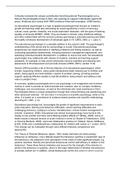Critically evaluate the unique contribution that Educational Psychologists (a.k.a.
School Psychologists) bring in their role working to support individuals aged 0-25
years. Illustrate your essay with TWO evidence-informed examples. (1500 words)
An educational psychologist is a type of applied psychologist that focuses on children's
growth and learning while also advocating for equal opportunity in terms of removing
cultural, racial, gender, disability, and social deprivation obstacles, with the goal of fostering
equality at all levels (EPNET, 2005). They are based in schools, early childhood settings,
and other related fields with the service's primary goal being to advocate learning and attain
the healthy emotional development of individuals aged 0–19. (DfES, 2005, p. 1, para.1).
The educational psychologist is a valuable addition to the school's staff. The psychologist's
understanding of the school and its surroundings is crucial. Educational psychology
programmes can assist educators in clarifying problems and finding solutions, as well as
conducting specialised assessments, including behaviour management approaches, and
assessing individual student development. In addition to one-to-one work, the educational
psychologist may collaborate with classes of students, teachers and learning support
assistants, for example, to help school employees improve expertise and assisting with
placements to lift achievement and promote inclusion (DfES, 2001a, section 10.8).
Gersch (2004) provides a list of the key features of an educational psychological, which
include: supporting children, using useful interpersonal skills; listening ear to children and
adults; being logical and level-headed; creative at problem solving; providing practical
support; applying effective studies to real-life problems; being empiric and adding a real
value to people’s lives.
In summary, applied psychologists are to use psychology in an imaginative and inventive
manner in order to provide an interconnected and cohesive view on complex conditions,
challenges, and circumstances, as well as the individuals who need assistance in them.
Psychologists deliver a unique perspective through their critical thinking and questioning and
other advanced methods. On one hand, it is focused on scientific psychology, while on the
other, it is based on a commitment to evidence-based practise and scientific methodology
(EuroPsychT, 2001, p. 8).
Educational psychology has “encouraged the growth of significant improvements in early
years education, learning and behaviour difficulties, severe learning difficulties and
challenging behaviour, bullying in schools, friendlessness, critical incident management in
schools” (Cameron, 2006). Educational and clinical neuropsychology have found to link
closely to one another and have some lifelong positive effects (cf. McKay, 2005), some of
these include a reduced amount of youth involved in crime (cf. Baxter & Frederickson, 2005,
or Wood & Starbuck, 2005), improved collaborative practice (cf. Holland, Dance, McManus,
& Stitt, 2005) and a multidisciplinary collaboration for children with autism (c.f. Jordan, 2001).
This change can be noticeable through many different theories, perspectives and
approaches.
The Theory of Planned Behaviour (Ajzen, 1991) states that there are three primary
influences on behaviour: one’s attitude toward the behaviour (positive or pessimistic view of
the behaviour), the subjective norm (perception of the views of other significant people, e.g.
parents, teachers, friends) and perceived behavioural control (self-efficacy in relation to the
behaviour). These three factors intertwine and account for the strength of the intention to
perform the behaviour in question, which is the major determinant of whether the behaviour
is actually carried out. In addition, actual behavioural control (the extent to which a person




